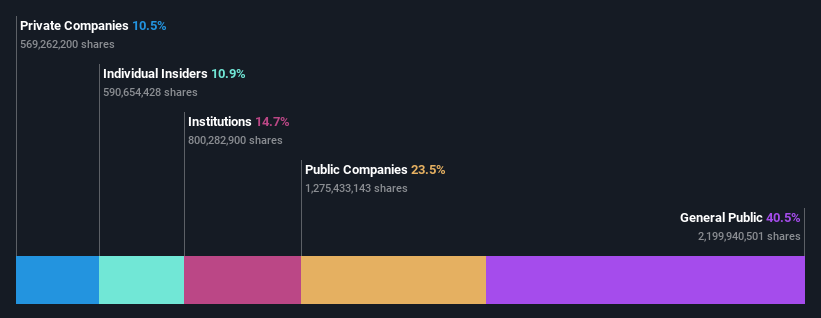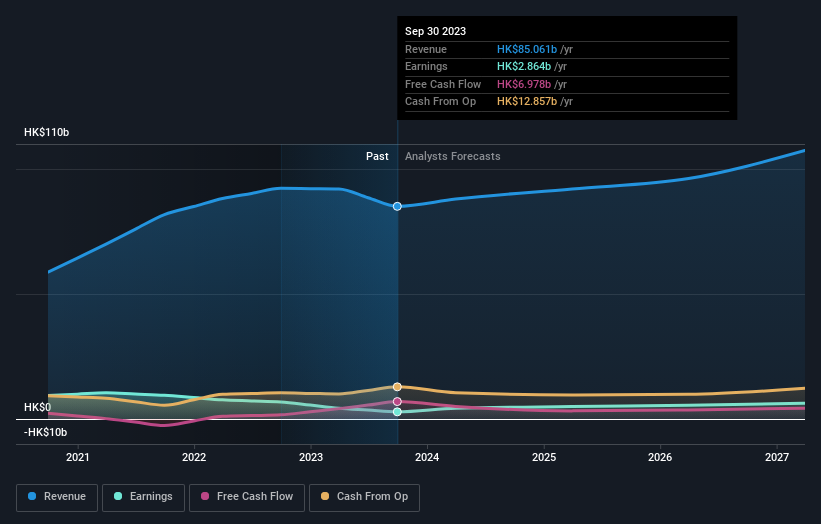- Hong Kong
- /
- Gas Utilities
- /
- SEHK:384
China Gas Holdings Limited (HKG:384) stock most popular amongst individual investors who own 40%, while public companies hold 23%

Key Insights
- China Gas Holdings' significant individual investors ownership suggests that the key decisions are influenced by shareholders from the larger public
- 52% of the business is held by the top 7 shareholders
- Insider ownership in China Gas Holdings is 11%
To get a sense of who is truly in control of China Gas Holdings Limited (HKG:384), it is important to understand the ownership structure of the business. With 40% stake, individual investors possess the maximum shares in the company. Put another way, the group faces the maximum upside potential (or downside risk).
Public companies, on the other hand, account for 23% of the company's stockholders.
Let's delve deeper into each type of owner of China Gas Holdings, beginning with the chart below.
See our latest analysis for China Gas Holdings

What Does The Institutional Ownership Tell Us About China Gas Holdings?
Many institutions measure their performance against an index that approximates the local market. So they usually pay more attention to companies that are included in major indices.
We can see that China Gas Holdings does have institutional investors; and they hold a good portion of the company's stock. This suggests some credibility amongst professional investors. But we can't rely on that fact alone since institutions make bad investments sometimes, just like everyone does. When multiple institutions own a stock, there's always a risk that they are in a 'crowded trade'. When such a trade goes wrong, multiple parties may compete to sell stock fast. This risk is higher in a company without a history of growth. You can see China Gas Holdings' historic earnings and revenue below, but keep in mind there's always more to the story.

We note that hedge funds don't have a meaningful investment in China Gas Holdings. The company's largest shareholder is Beijing Enterprises Holdings Limited, with ownership of 23%. With 10% and 7.5% of the shares outstanding respectively, First Level Holdings Ltd and Ming Hui Liu are the second and third largest shareholders. Ming Hui Liu, who is the third-largest shareholder, also happens to hold the title of Chairman of the Board.
We also observed that the top 7 shareholders account for more than half of the share register, with a few smaller shareholders to balance the interests of the larger ones to a certain extent.
Researching institutional ownership is a good way to gauge and filter a stock's expected performance. The same can be achieved by studying analyst sentiments. There are a reasonable number of analysts covering the stock, so it might be useful to find out their aggregate view on the future.
Insider Ownership Of China Gas Holdings
While the precise definition of an insider can be subjective, almost everyone considers board members to be insiders. Management ultimately answers to the board. However, it is not uncommon for managers to be executive board members, especially if they are a founder or the CEO.
Most consider insider ownership a positive because it can indicate the board is well aligned with other shareholders. However, on some occasions too much power is concentrated within this group.
Our most recent data indicates that insiders own a reasonable proportion of China Gas Holdings Limited. It has a market capitalization of just HK$40b, and insiders have HK$4.4b worth of shares in their own names. That's quite significant. It is good to see this level of investment. You can check here to see if those insiders have been buying recently.
General Public Ownership
The general public, who are usually individual investors, hold a 40% stake in China Gas Holdings. While this group can't necessarily call the shots, it can certainly have a real influence on how the company is run.
Private Company Ownership
It seems that Private Companies own 10%, of the China Gas Holdings stock. It's hard to draw any conclusions from this fact alone, so its worth looking into who owns those private companies. Sometimes insiders or other related parties have an interest in shares in a public company through a separate private company.
Public Company Ownership
It appears to us that public companies own 23% of China Gas Holdings. This may be a strategic interest and the two companies may have related business interests. It could be that they have de-merged. This holding is probably worth investigating further.
Next Steps:
It's always worth thinking about the different groups who own shares in a company. But to understand China Gas Holdings better, we need to consider many other factors. Be aware that China Gas Holdings is showing 3 warning signs in our investment analysis , and 1 of those is a bit concerning...
But ultimately it is the future, not the past, that will determine how well the owners of this business will do. Therefore we think it advisable to take a look at this free report showing whether analysts are predicting a brighter future.
NB: Figures in this article are calculated using data from the last twelve months, which refer to the 12-month period ending on the last date of the month the financial statement is dated. This may not be consistent with full year annual report figures.
New: AI Stock Screener & Alerts
Our new AI Stock Screener scans the market every day to uncover opportunities.
• Dividend Powerhouses (3%+ Yield)
• Undervalued Small Caps with Insider Buying
• High growth Tech and AI Companies
Or build your own from over 50 metrics.
Have feedback on this article? Concerned about the content? Get in touch with us directly. Alternatively, email editorial-team (at) simplywallst.com.
This article by Simply Wall St is general in nature. We provide commentary based on historical data and analyst forecasts only using an unbiased methodology and our articles are not intended to be financial advice. It does not constitute a recommendation to buy or sell any stock, and does not take account of your objectives, or your financial situation. We aim to bring you long-term focused analysis driven by fundamental data. Note that our analysis may not factor in the latest price-sensitive company announcements or qualitative material. Simply Wall St has no position in any stocks mentioned.
Have feedback on this article? Concerned about the content? Get in touch with us directly. Alternatively, email editorial-team@simplywallst.com
About SEHK:384
China Gas Holdings
An investment holding company, operates as a gas operator and service provider in the People’s Republic of China.
Established dividend payer and fair value.


